Diary of a young radical
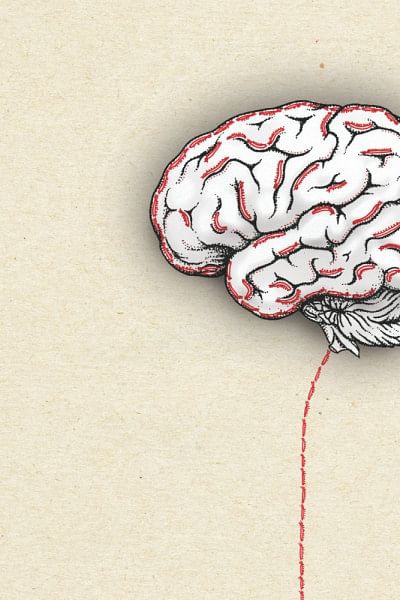
Since the emergence of the Islamic State in Iraq and Syria (ISIS) in mid-2014, the brutal ideology of the militant outfit has ensnared hundreds of young Bangladeshis, like it has brainwashed youth from across the globe. The mining of youth for this terrible avenue has been indiscriminate: young boys, and sometimes girls, have vanished from poor and rich families, irrespective of whether they went to madrasas or English medium schools. Many were motivated in real life to adopt the ideology, while others were self-radicalised by going through online materials.
One among these hundreds is Abdul Hadi, a boy of barely 20 years of age, apprehended by law enforcers from Narsingdi in January 2017. Hadi was forced to drop out of school due to crippling poverty and hardship his family faced after river erosion left them homeless in an under-developed northern district of Kurigram. At the age of 14, he left his village to work at a factory in Madhabdi, nearly 450 kilometres away from home. His only objective was to earn money and support his family. That aim was similar to all the others working in factories in Madhabdi, but what set Hadi apart was that he started maintaining a diary—something perhaps unexpected from a boy in his socio-economic reality.
M Abul Kalam Azad, a senior journalist of The Daily Star, came across the man, and the diary during a raid in Narsingdi last year. Hadi was picked up by the police from Madhabdi and indicted in a militancy case after police found that he was the admin of a Facebook group for recruiting youth to become radicals. Hadi himself had been radicalised online. In conversation with the correspondent, Hadi had said, "My only dream is to travel to Syria and join Jihad. But I don't have any money or ability to go. My dream will be fulfilled if someone comes forward to help me with money and other papers. I am waiting for that day to come."
Star Weekend is publishing excerpts from the young extremist's diary to shed light on the naivety and impressionability of the youth. Abdul Hadi was influenced by current events, like the killings of secular bloggers and moved by the actions of important militants. But he did not have the maturity to see beyond the simplistic narrative of the "war against Islam" that his idols instilled in him. The school drop-out who became a factory worker to support his family saw his education end early—from then on, his peers and mentors on social media, and the religious leaders of different mosques became his teachers. That is what shaped who he became. The purpose of the piece is to try and understand the mind of a radical to assist the government's efforts to fight radicalism.
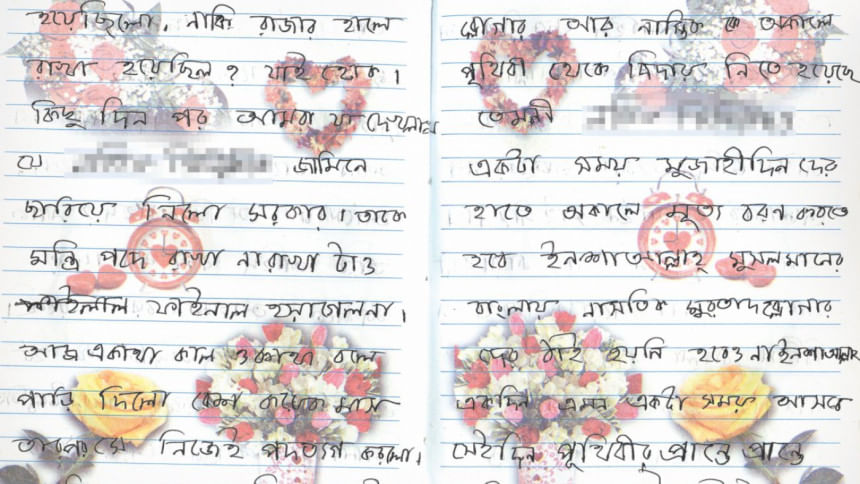
How does a young man get to the state where he is willing to lay down his life for ISIS's ideology? Hadi's diary documents the transformation. At first glance, the diary seems harmless, in fact, thoughtful—Hadi penned down songs, poems, jokes, stories, and flowers interspersed with random thoughts and notations. Yet a thorough reading of these pages exposes his slow radicalisation and reveals the formation of a fanatic who writes against atheists and bloggers, denounces women's rights, wishes to join jihad and cherishes death as a martyr.
The diary begins with a quartet from a song of the national poet Kazi Nazrul Islam, calling the believers to come to prayer in response to the Azan, as prayer promises solace in pain and strength during hardship.
Right next to this, Hadi writes: "The biggest court in the world is a person's conscience." Next comes a song again, this one proclaiming that this world is not the ultimate destination, as death will come to all one day, removing all charm of this worldly life.
For page upon page, Hadi notes down these kinds of poems, songs and small anecdotes, sometimes those from different personalities, and sometimes his own observations. He also expresses, within the same pages, love for someone unnamed.
"This life is short like a candle's flame, but I want to love you for all eternity. I will die if I move far away from you," he writes.
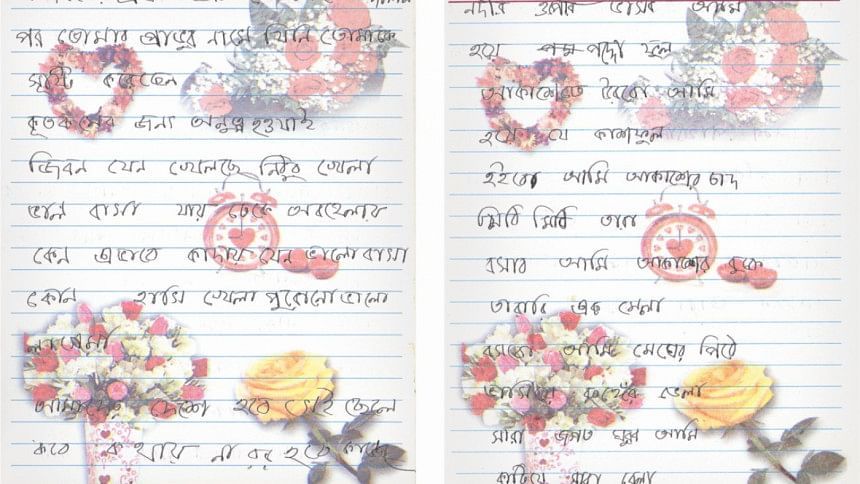
He started maintaining the diary sometime in 2014 and kept writing till the end of 2016, possibly days before his arrest. It does not have regular date entries, mostly written in a disorganised manner perhaps because he was not proficient in Bengali, English or Arabic.
Throughout the entries for the year 2014, there is a strain of romanticism without even a hint of the violence he would subscribe to in the near future. He writes poems about the birds and frogs beside the river, about wanting to fly and becoming a star in the sky, about his loneliness as a homeless nomad; he even writes one making the usual promises that a young boy might make to his beloved—of climbing tall mountains, jumping into the ocean, and laying down his life.
A deep-seated sorrow is the one common strain that Hadi expresses in various parts of the diary, and he seemed to be getting increasingly depressed. He writes: "All are the buyers of happiness but none is a seller. All want happiness but only 10 percent get it while 90 percent are deprived of it."
There are poems of his own too, mostly speaking of a desire to be a free bird flying in the open sky or praising the beauty of his countryside.
Reading through the initial part of the diary can arouse sympathy for the boy, but further reading reveals Hadi's alarming but sure transformation onto the deadly path of radicalisation.
On pages 35 and 37, Hadi practices writing the word Qayamat (Judgment Day) both in Bengali and Arabic.
What struck me first were his extreme views about jihad. "Jihad is power, jihad is freedom, jihad is a movement, jihad continues and will go on. Jihad will go on whenever necessary and will continue till Qayamat," he writes, with a note that "one should not create confusion between jihad and terrorism."
On page 43, he writes against atheists, terming them poor and comparing them with petrol which should be ignited.
Denouncing women's rights, he writes on one page: "In the name of equal rights, they want to bring women out of their homes, expose them and in this way they want to harm Muslims." He also criticises those who demean Islam in the name of being intellectuals and free thinkers.
There is a list of 10 persons on page 106 that includes al-Qaeda Osama bin Laden, Delwar Hossain Sayeedi as well as names like Abu Ayub Ansari and Ainuddin al Azad, Muhib Khan, Abu Raihan, Moulana Rezaul Karim and Tareq Munawar who have sung numerous Islamic songs, many of which directly espouse extremism and hatred. These songs are available on Youtube.
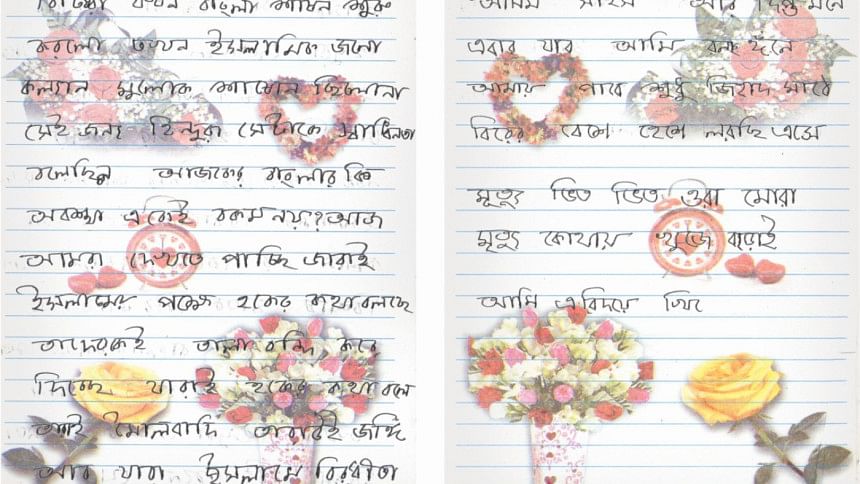
He begins to idolise people like Mullah Omar, the leader of the Afghan Taliban, and writes about his bravery in battle, in the face of hardship and physical injury. A few pages later, he goes on to write, reverting to his affiliation for poems and such: "They are scared, they have fear, and we go around seeking death."
He further idolises well-known radicals, writing tales about them. On August 31, 2015, he writes about Maulana Masud Azhar, a Pakistani alem who set off for Afghanistan to take part in jihad but was arrested on the way by the Indian army and imprisoned in India. While imprisoned, Azhar wrote a book, much like Delwar Hossain Sayeedi did. Later, Hadi writes, he was rescued by the Pakistani Taliban.
Hadi denounces the arrest of those who talk in favour of Islam by branding them radicals. On the other hand, he writes: "Persons taking a stance against Islam are being regarded as innocent and allowed to walk out of jail."
Elsewhere in the diary, the militant mentions the case of a former minister who commented against Hajj (the annual pilgrimage of Muslims to Makkah). He writes that although the former minister was arrested to assuage the agitated, he was in fact treated like a king in jail and released a few days later.
At this stage, Hadi, for the first time, demonstrates his most extreme view: "He will embrace death at the hands of mujaheeds, exactly the way Oyashiqur Rahman Babu, Niloy Chattapadhay, Ananta Bijoy Das and other bloggers have been dismissed from this world."
Hadi goes on writing, "The land of Muslims [Bangla] will never be a place for bloggers and atheists [Inshallah]. There will be an outburst of mujaheeds in Bangladesh too, and on that day, the dream of Shaiqul Hadith [ameer of Hefajat-e Islam], Jasimuddin Rahmania [the detained spiritual leader of banned Islamist outfit Ansarullah Bangla Team] and Bangladesh Jamaat-e-Islami Delwar Hossain Sayeedi [sentenced to life imprisonment on charge of committing genocide during Bangladesh's liberation war in 1971] will be accomplished. They won't be kept in the prisons then."
Writing about Facebook, he condemns the shutting down of the social platform for speaking against injustice (Hadi meant the shutting down of many Facebook pages and groups for inciting hatred and radical opinions in 2013 and 2014). He then writes: "None has been able to shut the path of truth and it also won't also be possible in Bangladesh," and goes on to mention that ISIS, Al Qaeda and Taliban agents are all over Facebook.... they are soldiers of jihad against injustice and those fearless mujaheeds are ever-present to shake Paris, Washington and London.
In one of the last pages, the young radical expresses his obedience to ISIS head Abu Bakr al-Baghdadi (who declared Caliphate from the historic al-Nuri mosque in Iraq's Mosul on July 4, 2014) and wishes to join Jihad as a brave solder in search of death. He calls upon all mujaheeds to take a pledge and prepare for a new jihad to establish Islam across the world.(Hadi had no idea that the global terror organisation was fast losing territory both in Iraq and Syria and also the dream of establishing its so-called Caliphate.) On a couple of pages, he prays for a martyred death.
In the last page of the diary, he notes someone's address and phone numbers and ends with a few lines of the National Anthem.
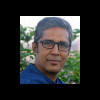









Comments